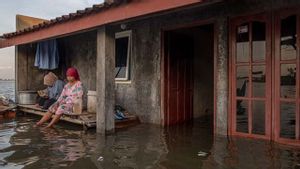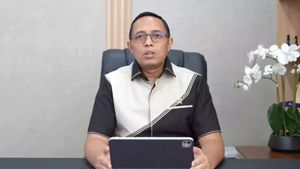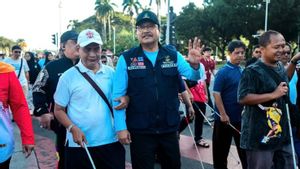JAKARTA - Bali is considered as one of the provinces that has succeeded in controlling the spread of COVID-19 without implementing Large-Scale Social Restrictions (PSBB).
In fact, since the COVID-19 case was detected in Bali on March 10 until now, the number of positive COVID-19 patients has reached 314 people with an additional seven cases every day.
According to Bali Governor I Wayan Koster, this is due to the participation of traditional villages in Bali. According to him, customary villages with inherent customary laws have succeeded in making people not arbitrarily go in and out of an area.
"Traditional villages have a local wisdom with customary law that can bind people in their respective customary village areas," said Koster in a press conference after a closed meeting with Jokowi to discuss the PSBB evaluation which was broadcast on the Cabinet Secretariat YouTube account, Tuesday, May 12.
Another local wisdom that is used to prevent the spread of COVID-19 is a traditional religious ritual or what is commonly known as Niskala. This ritual, said Koster, was usually done during an outbreak like the current condition.
"Indeed, there is an ancestral heritage that is used as a guide to do it ritually," he said.
Apart from utilizing local wisdom, Bali also has other strategies such as implementing three steps in fighting the spread of COVID-19 without PSBB. The first is to issue policies through circular letters containing appeals and instructions from President Jokowi.
Furthermore, at the district / city level coordination of the operational implementation of handling COVID-1 and at the lowest level the policy is left to customary territories which then regulates customary villages.
In addition, because the spread of COVID-19 in this region occurs due to transmission from residents returning to work abroad, one of the steps to reduce this spread is to quarantine migrant workers who have just arrived in the country.
Those who are negative based on the results of the test with the polymerase chain reaction (PCR) method, said Koster, will be quarantined in a place that has been determined by the regency / city government.
As for those who were positive, they were referred to a hospital or a special place that had been provided by the provincial government and all medical expenses were covered.
Not only quarantine, massive tests are also carried out by the Bali provincial government for its citizens who have just returned from abroad. The goal is so that the spread of COVID-19 can be controlled even though this region does not implement the PSBB.
Bali, he said, has also set three indicators to measure the success of handling COVID-19. The three indicators are holding back the rate of positive patients, increasing the percentage of cure, and holding back the number of deaths.
"So cumulatively, the number of patients in the hospital will continue to decline. Those being treated are now 100 people or 32 percent," he explained.
Previously reported, the government emphasized that the implementation of the PSBB would not be forced. Chairperson of the Task Force for the Acceleration of Handling COVID-19 Doni Monardo said President Jokowi had actually freed local governments to take policies to combat the virus.
"The President emphasized that the central government will not impose the PSBB on the regions. Regions may choose an approach that suits their respective conditions," said Doni.
In addition, he also said that President Jokowi would welcome the regions to take advantage of local wisdom in order to increase public compliance in implementing health protocols.
"So even though there is no coercion, it is hoped that the regions can improve their capabilities in compliance with health protocols," he concluded.
The English, Chinese, Japanese, Arabic, and French versions are automatically generated by the AI. So there may still be inaccuracies in translating, please always see Indonesian as our main language. (system supported by DigitalSiber.id)













